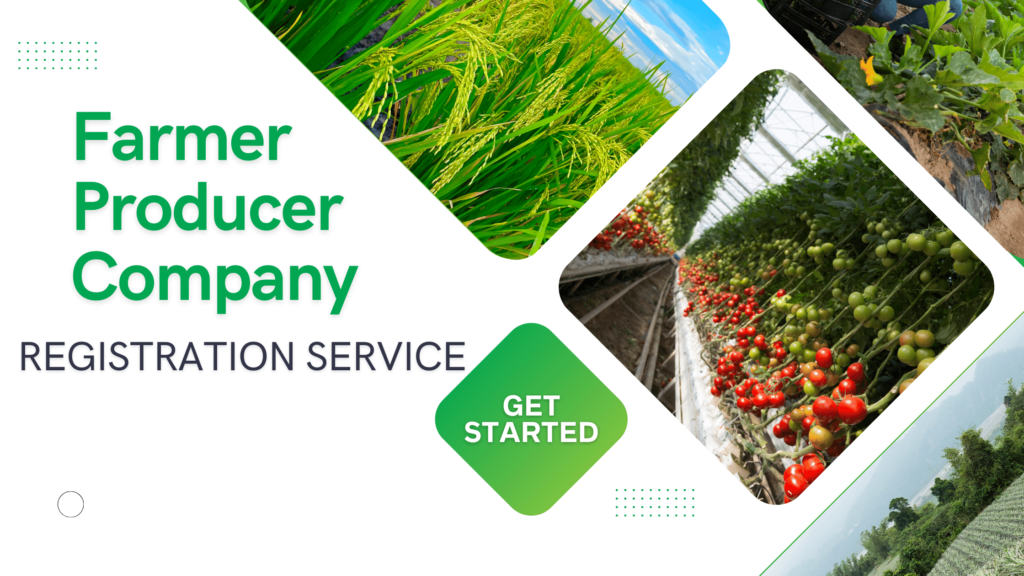Farmer Producer Company Registration in India

India’s economy relies a lot on farming. About 60% of people make a living by farming. However, farmers in India have faced many challenges.
To tackle these issues, the Indian Government formed a group of experts led by Y.K. Alagh, an economist. In 2002, they came up with the idea of Producer companies for India. Since then, these companies have been helping farmers get things like seeds, money, better farming methods, and ways to sell their products.
What is a Producer Company?
A producer company is like a legal group of farmers who work together to make their lives better. They want to improve their support, earnings, and profits. According to the law (Companies Act, 2013), a producer company can be set up by 10 people or more, or by 2 institutions or more, or a mix of both (10 people and 2 institutions). The company’s goal is specified in the law.
A farmer-producer company is a mix of private limited companies and cooperative societies, and it’s registered under the law. It follows democratic rules, meaning each member or producer has the same voting rights, no matter how many shares they have.
Objectives of the Farmer Producer Company
The main goal of a farmer-producer company is to help farmers work together as a business. It allows existing co-operative businesses to become companies.
According to the law, a producer company can focus on things like:
a) Helping farmers with production, harvesting, selling, and exporting their goods.
b) Processing and preserving the things farmers grow.
c) Making and selling machinery or equipment for farmers.
d) Teaching farmers and others about mutual assistance principles.
e) Providing services like technical help, consultancy, training, and research for farmers.
f) Generating and distributing power, and taking care of land and water resources related to farming.
g) Insuring farmers and their goods.
h) Encouraging mutual assistance techniques.
i) Offering welfare measures or facilities decided by the company’s board for the benefit of its members.
j) Doing any other activity connected to the ones mentioned above or promoting mutual assistance among members.
k) Providing financial help for things like buying, processing, and selling products, including offering credit or other financial services to its members.
Authorized Activities of Producer Companies
The Producer Company must handle the things its members produce and can do these activities:
Processing: This includes preserving, brewing, drying, distilling, canning, and packaging the things its members produce.
Making, Selling, or Supplying Equipment: The company can provide machinery, equipment, or other things to its members who produce goods.
Educating Members: The company can teach its members and others about mutual assistance principles.
Providing Services: This includes consultancy, technical help, training, research, and other activities that help the interests of its members.
Power and Resources: The company can be involved in generating, transmitting, and distributing power. It can also focus on conserving land and water resources related to what its members produce.
Insurance: The company can insure the things its members produce and the members themselves.
Promoting Mutual Assistance: The company can encourage techniques of mutual help among its members.
Welfare: The company can decide on measures for the well-being of its members.
Financing: The company can help with buying, selling, processing, and other activities. This includes giving credit or other financial help to its members.
Any other activity: The company can do other things connected to its main goals that promote mutual help among its members and follow the principles of mutuality.
Note: The term “primary produce” in the Companies Act of 1956 means stuff that comes from farming, like what farmers make. This includes things like crops, animals, flowers, fruits, grapes, fish, growing trees again, raising bees, managing forests, and products from hand-made items or small industries like weaving and crafts.
Before Starting a Producer Company:
Who Can Join:
10 or more individuals (producers) can form a producer company, with no maximum limit.
Alternatively, 2 or more producer institutions can also create a producer company.
Capital and Directors:
A minimum paid-up capital is needed to set up a producer company.
There should be at least 5 directors (up to a maximum of 15) in a producer company.
Conversion and Registration:
A producer company cannot become a public company, but it can change into a multi-state co-operative society.
The registration process is similar to that of a private limited company.
Naming the Company:
The name of the producer company must end with “Producer Limited Company.”
Steps for Registration of Producer Company
Digital Signature and Director Identification Number (DIN):
Directors need a Digital Signature Certificate (DSC) and a Director Identification Number (DIN).
Name Reservation:
Apply to the Registrar of Companies (ROC) with two preferred names ending with “Producer Company.”
Documents Preparation:
Draft a Memorandum of Association outlining the company’s objectives.
Create Articles of Association with the company’s by-laws.
Get an affidavit signed by all subscribers declaring their competency.
Obtain a utility bill and a No Objection Certificate (NOC) from the registered office’s owner.
Submission to ROC:
Attach all documents to Form SPICe+ and submit them to the ROC.
Certificate of Incorporation:
Upon verification, the ROC will issue a Certificate of Incorporation.
Benefits of Farmer Producer Companies:
Value for Produce:
Members receive value for their pooled and supplied produce.
Bonus Shares:
Members can get bonus shares in proportion to their holdings.
Patronage Bonus:
Surplus income may be distributed as a patronage bonus to members.
Loans and Investments for Producer Company
Credit Facility:
Available for business-related needs for a period not exceeding six months.
Loans and Advances:
Provided against security, repayable within seven years.
NABARD Support:
NABARD offers financial assistance through the Producer Organisation Development Fund (PODF).
Tax Benefits for Producer Company
Agricultural income is exempted under section 10(1) of the Income Tax Act, 1961.
Specific tax benefits depend on the agricultural activity carried out by the producer company.
For instance, selling green tea leaves is 100% tax-free, but processing them incurs a 40% tax.
Starting a producer company helps farmers earn more collectively and directly sell products to consumers.
Benefits FAQs: Farmer Producer Company Registration in India
A Farmer Producer Company (FPC) is a type of organization formed by farmers to work together for better farming practices, marketing, and selling of their produce. It helps farmers join hands to improve their income and overall well-being.
Any farmer or a group of farmers can become a member of a Farmer Producer Company. It encourages the unity of farmers, enabling them to share resources, knowledge, and profits for mutual growth.
Registering a Farmer Producer Company brings various benefits, such as collective bargaining power, better access to credit, improved market linkages, and increased efficiency in agricultural activities. It empowers farmers to make informed decisions collectively.
To register an FPC, farmers need to follow a simple process that involves creating a group of at least 10 individuals or two institutions. They should then submit the necessary documents to the concerned authorities, such as the Registrar of Companies (RoC).
The basic documents required for Farmer Producer Company registration include identity proofs, address proofs, and PAN cards of the members. Additionally, a detailed business plan and a memorandum of association are essential.
Yes, FPCs are eligible for various financial incentives, subsidies, and loans from government schemes. This financial support is aimed at promoting and sustaining agricultural activities, ultimately benefiting the farmers.
An FPC facilitates direct selling of produce, eliminating middlemen and ensuring better prices for farmers. It also provides access to modern farming techniques, reducing input costs and increasing overall profitability for the members.
Yes, FPCs can engage in various activities related to agriculture and allied sectors, such as processing, packaging, and marketing of agricultural produce. This flexibility allows them to explore diverse avenues for income generation.
Yes, the government offers support in the form of subsidies, grants, and technical assistance to promote the formation and growth of FPCs. This support aims to strengthen the agricultural community and enhance the overall rural economy.
The time taken for FPC registration can vary, but the process is generally streamlined. With all the required documents in place and proper adherence to procedures, it can take a few weeks to complete the registration process.

